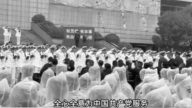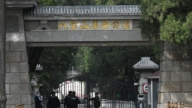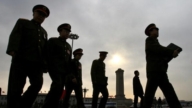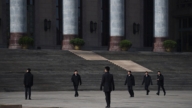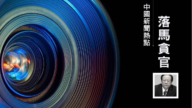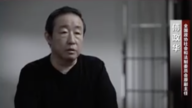【新唐人2012年11月13日訊】胡錦濤在十八大提出報告表示,要實施「黨代會代表提案制」,《新華網》11號說,這是黨的代表大會制度的又一項重大完善措施,並說這將會促進黨內民主。不過評論人士認爲,「黨代會代表提案制」難保不像「人大代表建議」一樣流於形式,而普通黨員連言論和公平競選的權利都得不到保證,黨內民主還很遙遠。
十八大報告中提出,今後黨代會代表對黨的大政方針等,都可以以制度化方式提出意見和建議。《新華網》11號聲稱,這是中共首次正式做出的涉及「黨內民主機制」的重要決定。不過民間對於《新華社》熱情讚揚的這項所謂「黨代會代表提案制」,反應並不熱情。
財經作者段育文發表微博分析:「黨代會代表提案制」看上去很美,但是第一、如果只是搞提案,沒有決策權的話,或者決策權在主席團裏面,就不免流於形式;第二、現有制度下黨代會五年一次,也就是五年才能提案,還不如兩年一次的人代會制度;第三、「黨代會代表提案制」只適用於黨內民主,而黨員人數相對13億人口侷限性太大。
獨立評論員李善鑒認爲,「黨代會代表提案制」只是形式上的東西,沒有任何的實質意義。
李善鑒:「因為講民主,實際上就是說讓多數人參與決策,然後對權力有一個制約。可是,它這整個報導裡提的這個事情,無非就是說你提案,也就是說你可以提一些建議,具體做不做,具體怎麽做,這個你沒有任何權力。」
國內觀察人士認爲,在現行機制下,缺乏監督和管理,「黨代會代表提案制」很可能重蹈「人大代表建議」和「政協委員提案」的覆轍,只能提出卻很難落實。
山東大學退休教授孫文廣:「這些議案…我以前當過政協委員,也寫過不少,它就是一種形式的,做一個表面的樣子。你寫了以後,他也不公開,放在上面就算了,實際問題解決不了。」
除了對「黨代會代表提案制」本身的質疑,民間還有聲音質疑那些能夠獲得提案權的「黨代表」,能否傳遞基層的真實聲音﹖
孫文廣:「這個『黨代表』怎麽選是個大問題,現在是指定的是上面組織部定好的,然後拿一個名單,你們去選去吧,這是騙人的了。」
十八大提出實行「黨代會代表提案制」,繼續十七大高唱「黨內民主」的調子,不過觀察人士指出,連溫家寳提政改都遭封殺,黨內民主缺乏最基本的前提。
孫文廣:「一個前提就是表達的自由權利。你是不是讓人講話,講了以後是不是可以在媒體上傳播。第二個,就要開展公開、公平的競選。黨內的民主如果這兩點要有的話,就有希望了。但是現在的情況還是看不到。」
「黨內民主」是胡錦濤在十七大報告中五次提到的「關鍵詞」。不過之後五年中,除了基層黨組織的「公推直選」試驗,被大陸媒體視爲革新而大量報導,而民主監督產生黨代表和幹部的方式,卻遲遲無法涉及到中共體制的中高層。 另外,「黨代表常任制」的試驗也徘徊不前。
李善鑒:「 從這些決定來看的話,和其它有關十八大的報導,我們可以清楚的看到,實際上它沒有任何實質的變化。那表面上的幌子肯定要有,講的冠冕堂皇。」
在薄熙來事件牽引出的無數內鬥和貪腐黑幕的衝擊下,今年十八大如履薄冰的召開。官方一面在《新華社》等媒體上高調讚揚十八大,一面嚴格監控和隔離異議人士和維權民眾,對藏人的自焚抗議也採取迴避態度。
採訪/田淨 編輯/尚燕 後製/蕭宇
New “Party Congress Proposal System" Looks Good on the Surface
Chinese president Hu Jintao gave a speech during the
18th Chinese Communist Party (CCP) Congress.
He said the CCP needs to implement a
“Party Congress Proposal System."
Xinhua.net said on Nov. 11 that this is significant progress
for the party’s congress system, which will promote democracy within the party.
But commentators say it is difficult for this “Party Congress
Proposal System” to be different from the current Party Congress system, which is a mere formality.
Ordinary party members don’t even have
freedom of speech and fair election.
“Inner-Party Democracy” is still very distant.
The 18th CCP Congress report mentioned that
party representatives will be able to raise comments
and suggestions on party policies in the future.
On Nov 11 Xinhua.net claimed this as the first of CCP
decisions regarding “inner-party democracy mechanisms.”
But people are not enthusiastic about this so-called
“Party Congress Proposal System.”
Finance writer, Duan Yuwen analyzed on his micro blog:
this “Party Congress Proposal System" is nice sounding.
However, if it is only about making proposals,
there is no decision-making power; so it is just a formality.
Secondly, the party congress is being held every five years,
that means proposals can be done only once in five years.
Third, the proposal is limited to democracy for people
within the party,
yet the number of party members is small
when compared to China’s population (1.3 billion).
Independent commentator Li Shanjian thinks the “Party
Congress Proposal System" is a formality, it has no substance.
Li Shanjian: “Democracy’s purpose is to have more people
participate, so as to limit those in power.
What has been reported is only about making proposals.
As to whether those suggestions are carried out or not,
people do not have the right to make the decisions.
Observers in China think the current system
lacks monitoring and management.
The “Party Congress Proposal System" might be the same
as the “National People’s Congress Proposals” or
the “Committee of CPPCC Proposals,”
where implementing them is difficult.
Shandong University retired Professor, Sun Wenguang:
“I was once member of the Committee of CPPCC.
I have written many of these, which was a mere formality.
Whatever I wrote was not published, nor resolved.”
In addition to questioning the proposal system, people also
question whether those representatives pass on messages from the grass-roots level.
Sun Wenguang: “How were those party
representatives elected? Now they are nominated.
Candidates were pre-determined by those above since people
are given a name list to vote for. It『s all for show.”
The “Party Congress Proposal System” of the 18th Congress
is a continuation of the “Inner-Party Democracy” policy raised during the 17th Congress.
Observers pointed out even Premier Wen Jiabao’s
proposal for reform was obstructed.
Sun Wenguang: “One premise is freedom of expression,
that is, whether someone can say things against others
and be published via the media.
Secondly, fair election needs to be implemented.
If democracy within the CCP includes these two,
then there is hope; but now, we cannot see it.”
“Inner-Party Democracy" was mentioned five times
during Hu Jintao’s speech at the 17th Congress.
But after five years, except for the widely reported
“Direct Election” experiment in grassroots party organizations,
democratic election oversight of party representatives and
cadres cannot reach the CCP’s high-level officials.
Li Shanjian: “From these decisions
and other news of the 18th Congress,
we can clearly see there is no fundamental change.
They only want to cover-up the surface.”
Under the impact of internal struggles,
and corruption revealed by the Bo Xilai scandal, the 18th Congress was walking on thin ice.
On one side, official media highly praise the 18th Congress;
on the other hand, dissidents and human rights defenders are
strictly monitored.
The government also has been evasive toward
Tibetan self-immolation protests.


